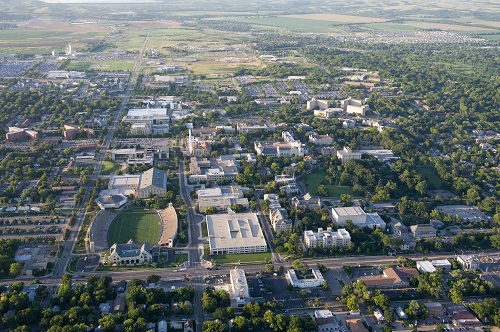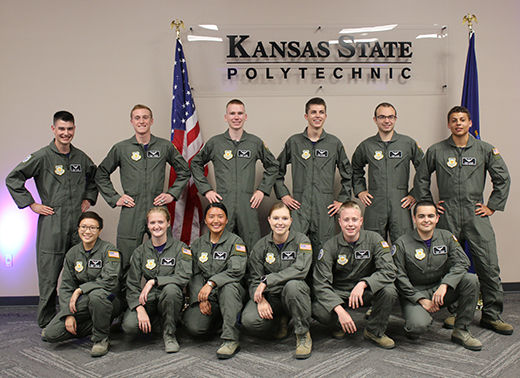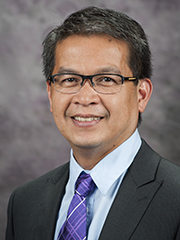08/08/18
K-State Current - August 8, 2018
K-State Current is a weekly news update for the Kansas Board of Regents to apprise the Regents on a few of the many successes and achievements made by K-State faculty, staff and students.
K-State News
Kansas State University Polytechnic Campus partners with Air Force Junior ROTC to help train young pilots
 The Kansas State University Polytechnic Campus has joined a new aviation initiative created by the Air Force Junior ROTC that is aimed at boosting enthusiasm for flying among high school students as well as contributing to the industry's pilot shortage solution.
The Kansas State University Polytechnic Campus has joined a new aviation initiative created by the Air Force Junior ROTC that is aimed at boosting enthusiasm for flying among high school students as well as contributing to the industry's pilot shortage solution.
Kansas State Polytechnic is a partner school in the Air Force Junior ROTC's Flight Academy, a scholarship program awarded by the chief of staff of the U.S. Air Force for the first time this summer that assists cadets with earning their private pilot certificate at an accelerated pace. The campus is one of six institutions across the country hosting students and providing their flight training. Out of the 800 who applied, 120 cadets were accepted into the inaugural program with 12 participants landing at Kansas State Polytechnic.
The idea for Flight Academy first was conceived as a way to address the Air Force's ongoing aircrew shortage. While high school students enrolled in Junior ROTC and selected for the program are not required to commit to a military track, the initiative hopes to inspire an interest in aviation that eventually leads to a career in aviation — either military or civilian — and an overall positive effect on the nationwide pilot shortage dilemma. Flight Academy also addresses the aviation community's diversity concern: 55 percent of those who applied for the 2018 scholarships are female or minority cadets.
"Supporting the advancement of aviation education, especially in youth, has always been an important priority to Kansas State Polytechnic and we're proud to be collaborating with an organization that has such a positive influence over young people's lives," said Bill Gross, chief flight instructor and aviation professor at Kansas State Polytechnic. "Learning to fly is challenging and requires focus, but it has the ability to open doors and transform someone's future. We're excited to spark a passion for aviation in these students and help set them on a path to personal and professional success."
Beginning June 11, Air Force Junior ROTC cadets were on campus for seven weeks working toward their private pilot certificate. They attended ground school three hours a day, Monday through Thursday, and were in the cockpit flying at least two times a day, several days a week. The young aviators learned about such topics as federal aviation regulations, aerodynamics, aircraft performance, weight and balance, weather and navigation, and the systems on an airplane.
Because they stayed in the residence halls, cadets also got the opportunity to build camaraderie and experience typical collegiate student life, participating in off-campus outings, late-night study sessions and recreational events. They even met with Kansas State University President Richard Myers, eating dinner with him at his home on the Manhattan campus. Myers is a retired four-star Air Force general and former chairman of the Joint Chiefs of Staff. A K-State alumnus, his military career began as a member of the university's Air Force ROTC program.
The cadets' last day at Kansas State Polytechnic was July 27 when they were honored for their achievements in front of family and friends at a closing ceremony. At the event, they wore their official Air Force flight suits and received a completion certificate from Kansas State Polytechnic as well as a wings patch from the Air Force Junior ROTC.
"I want to thank Kansas State University and the Polytechnic Campus for stepping up, taking a chance and investing in a new program that develops young people and gets them interested in aviation," said Todd Taylor, retired Air Force colonel and director of program development for the Air Force Junior ROTC, at the closing ceremony. "Being a pilot changes you — the way you think and react to different situations. Because of this program and the training that was received, the manner in which these cadets take on missions and take on life is forever strengthened. I am so proud of your hard work, determination and your success."
Contingent on funding, Flight Academy will grow exponentially in the coming years. This year, the Air Force awarded 120 scholarships, and if financing continues, will grow to 250 in summer 2019, and 500 in summer 2020. Plans also could open the program to Army, Navy, and Marine Junior ROTC programs as well as Civil Air Patrol cadets by 2020.
Kansas State Polytechnic was chosen as a partner school in the Flight Academy initiative because of its accreditation with AABI, the Aviation Accreditation Board International, and the university's Air Force ROTC program. To learn more about the professional pilot bachelor's degree option at Kansas State Polytechnic, contact admissions at 785-826-2640 or polytechnic@k-state.edu.
Maureen Olewnik, coordinator of the K-State Global Food Systems Initiative, presented an invited talk to more than 1,800 attendees at the 10th International Symposium of Food Science in Hefei, China, last week.
Olewnik discussed the growing complexity of the global food system and the challenges we face in feeding a growing population, including loss of arable land, limited water and climate variability. She shared how a transdisciplinary, systems thinking approach can help address the complex, interconnected problems of the food system and argued that scientific and social science communities must work together to solve them. According to Olewnik, K-State has made great progress in bringing people from diverse disciplines together.
Her presentation prompted candid discussion of the diverse and complex food-related challenges the world is already seeing.
"Talking to international audiences provides the opportunity to develop a more complete and mutual understanding of the one-world issues in the safety and sustainability of food," Olewnik said.
Olewnik is also serving as president-elect of the American Association of Cereal Chemists, known as AACC International. Her talk also addressed the work of AACC International. The organization's mission is to create opportunities for providing and exchanging knowledge and advancing innovations across the broad disciplines of cereal grain science by facilitating research, education, collaboration, technical service and advocacy efforts. Olewnik has been a member of AACC International for more than 30 years and finds that the research issues and challenges in cereal chemistry are a microcosm of global challenges.
"Casting a wide net in the understanding of the complex challenges the world faces in the safety and sustainability of food is what K-State's Global Food Systems is about. Expanding our approach to identify cross-disciplinary problem solving within K-State's research and educational system is the start," Olewnik said.
"Continuing outreach to the national and international communities on the importance of a broad-based approach to these complex issues helps to provide actionable interaction in solving the looming worldwide challenges," she said.
Olewnik will serve as AACC International president for the year beginning in October of 2018.
K-State Faculty Highlights
Maghirang named fellow of international professional society
Ronaldo Maghirang, Kansas State University College of Engineering associate dean for research and graduate programs, and professor of biological and agricultural engineering, has been honored by the American Society of Agricultural and Biological Engineers, or ASABE, with selection to the grade of fellow at ceremonies during the group's 2018 annual meeting, July 20-Aug. l, in Detroit. 
The society defines a fellow as a member of unusual professional distinction with outstanding and extraordinary qualifications and experience in, or related to, the field of agricultural, food or biological systems engineering. ASABE fellows possess a minimum of 20 years of active practice in, or related to, the profession of engineering; the teaching of engineering; or the teaching of an engineering-related curriculum and a minimum of 20 years as an active member-engineer or member in ASABE.
In receiving ASABE's highest honor, Maghirang, a 25-year member, was cited for "his outstanding global leadership and contributions to the advancement of animal and facility systems through teaching, research and service."
His research has focused on low-cost air pollution measurement; measurement, monitoring, modeling, and control of air emissions from agricultural operations and off-road activities; measurement, control, and modeling of indoor air quality in agricultural buildings; particle technology; environmental applications of nanotechnology; and improved grain handling and storage.
K-State Student News
A new creamy protein-rich dairy drink has Kansas State University success written all over it.
Three Kansas State University food science graduate students — Yuda Ou, China, and Priyamvada Thorakkattu and Karthik Sajith Babu, both from India — were awarded first place and $8,000 in the National Dairy Council's annual New Product Competition for Quick-Quark, a new drinkable dairy snack based on the German-style quark cheese.
"Quick-Quark's texture is very smooth and creamy," Ou said. "It has a rich mouthfeel comparable to a full-fat yogurt. Our product has 14 grams of protein in a 150-gram serving, which is almost double the amount of popular Greek yogurt drinks and more than double the number of popular yogurts targeted toward children."
The students — working in the university's Food Science Institute — mixed whole milk, cream, milk protein concentrate and sweetened condensed milk, then fermented the ingredients with live cultures to produce a mildly tart quark base with 30 percent daily value of calcium and 10 percent daily value of vitamin D.
"The students worked effectively as a team, putting in many long hours to develop a unique product and went the extra mile by perfecting two flavors of Quick-Quark for the judges to critique," said Kelly Getty, associate professor of animal sciences and industry and team co-adviser.
In a resealable pouch with a 30-day shelf life, Quick-Quark combines natural dairy ingredients with live cultures, which help aid digestion. Using real fruit, the students developed two different flavors: pina colada and acai blueberry, which has a distinct Kansas State University purple.
"Both flavors performed very well," Ou said. "We asked 50 consumers in the age range of 17-55 to taste both products and rate on a 9-point scale with 1 meaning they disliked it extremely and 9 meaning they liked it extremely. Acai blueberry received an average of 7.5 and pina colada received 7.3 for liking the overall product."
According to the National Dairy Council, snack foods are more common now than in the past and have replaced meals in some people's diets, which is why the 2018 competition challenged students to develop tasty, nourishing and filling on-the-go snacks. Ou, Thorakkattu and Sajith Babu developed their core concept for Quick-Quark with those criteria in mind but also wanted a product that was easy to market.
"The students wanted to develop a product that was not too familiar to consumers but has an appeal that will give it more visibility," said Jayendra Amamcharla, associate professor of animal sciences and industry and team co-adviser. "I think Quick-Quark will be the next Greek yogurt. In 2007, Greek yogurt wasn't popular in the United States, but now it's approximately 40 percent of the total yogurt sales."
The product isn't available in stores yet but the students are looking for the right opportunity to start marketing Quick-Quark. Randy Phebus, Food Science Institute interim director, said the first-place win will help give the students many opportunities.
"This win continues a strong tradition of success that our K-State product development teams have experienced in national and international competitions over the last several years, and we are very proud of this year's team win," Phebus said. "These experiences and successes open many career doors for our food science students across the global food industry."
K-State students accepted to Scholars in Rural Health program
Seven Kansas State University students from the College of Arts and Sciences were recently accepted to the Scholars in Rural Health program. This early acceptance program is specifically for Kansas residents from rural areas with a desire to return and practice rural medicine. Students apply for the program in the second semester of their sophomore year in college.
The program provides scholars assured admission to the University of Kansas School of Medicine upon successful completion of program requirements and graduation from their undergraduate institution.
The following students from the College of Arts and Sciences were accepted to the Scholars in Rural Health program:
Micah Meyer, biochemistry and molecular biophysics, Bern; Karleigh Arndt, biology, Fort Scott; Quinton Elliot, biology, Great Bend; Matt Mindrup, biology, Hays; Kaden Brandt, biology, and Brandt Rose, biology, both from Holton; and Andrea Vierthaler, life sciences, Isabel.
Annaka Applequist, kinesiology student from the College of Human Ecology, Hays, also was accepted into the program.
"Each of these students has excelled academically, especially in their science courses thus far," said pre-health professions advisor Kaela Urquhart, "and they have all shown initiative in shadowing and service opportunities in order to qualify for this program."
The College of Arts and Sciences dean's office extends a warm congratulations to all of these students on their acceptance into the Scholars in Rural Health program.
Visit the Arts and Sciences Pre-health Professions page to learn more about pre-health opportunities in the College of Arts and Sciences.